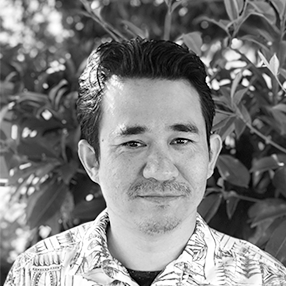He Mea Māloʻeloʻe #3
to my kūpuna, Kaahanui & Pelekanoho
I cannot draw a line beyond your names,
back through the brindled understory
along Pīnaʻau stream, ma uka. This cord
has gone as far as it can go for now,
anchored to the pōhaku there, baking
his chest and gossiping with the other stones
about who slept with who?
One of you knew olonā well,
so I’ve been told, which explains
my love for the braid, my love
for the word taut, and my desire
to always look for the fray’s inevitable
unraveling. My obsession
with what time can do to a spine.
One of your great-great-great-grandchildren
(my grandfather) would pour paʻakai
into his pant pocket as a child
whenever he went into the forest.
I do that, too, sometimes, as an adult.
Did you teach us that?
Tell me a story e kuʻu mau kūpuna ē,
Please. Who were the gods you smiled for?
Who were your favorite plant people?
And what was the word you used to describe
the sound of the whales slapping their tails off the coast
of our Keʻanae, that vibrated the lau in the loʻi?
As I dream about how your cheekbones beveled
in afternoon shade I wonder if you both enjoyed
kneeling over tide pools as much as I do?
Of course you did.
I also wonder if my body
will hold this line for my daughter
with the same aloha wrapped around
this olonā now spilling from hers.
Copyright © 2024 by Donovan Kūhiō Colleps. Originally published in Poem-a-Day on May 3, 2024, by the Academy of American Poets.
“This poem is a daydream from a longer sequence inspired by a handwritten moʻokūʻauhau, or genealogy, found in my great-grandfather’s journals. The lines between generations can be enduringly sticky, and I love the idea of how a small mannerism of mine or a certain proclivity to stare a little too long above a city intersection at a cluster of trolley car wires is also an inheritance. In my early thirties, I found my most treasured paragraph in his journal. He writes about how his elders would sail between Maui and Hawaiʻi throughout the 1800s, trading their olonā cordage for fish.”
—Donovan Kūhiō Colleps

